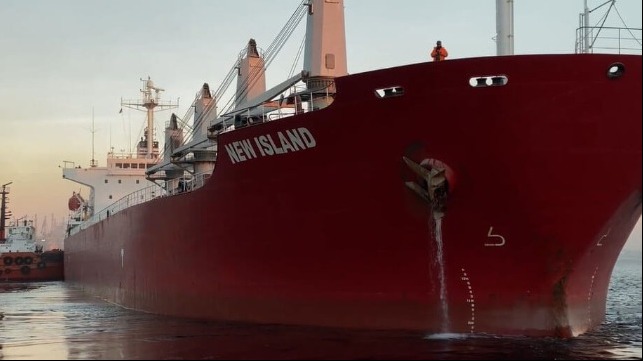Bulker New Island departed Chornomorsk last week as the fifth chartered vessel to carry wheat exports for the UN’s World Food Program (Ukraine’s Ministry of Infrastructure)
With Russia having increased its attacks in recent days on the infrastructure and civilian targets in Ukraine, fears are growing that Russia could also move to block an extension of the grain deal that is permitting ships to export gains from three Ukrainian ports. The agreement brokered by the United Nations with the assistance of Turkey began in late July and lasts for 120 days.
Emphasizing the importance of maintaining the exports, UN officials have begun the delicate talks to extend and possibly expand the export agreement. On Sunday, October 16, Ukraine’s Minister of Infrastructure, Oleksandr Kubrakov, meet with Turkey’s Defense Minister Hulusi Akar at the Joint Coordination Center in Istanbul along with representatives of the United Nations. The negotiations are aimed at the implementation of the grain initiative and its continuation after November 22.
Since the first vessel departed Ukraine on August 1, a total of 719 voyages have been cleared after inspections in Turkey. Data from the UN indicates that 365 inbound voyages to the three Ukrainian ports have been cleared as of October 18 with 354 outbound voyages completed. More than 7.8 million metric tons of grain have been exported primarily consisting of corn and wheat. Smaller quantities of sunflower products, soybeans, and barley were also exported.
The UN had cited the urgent need to get the products to poorer nations and those facing famine. However, of the 354 outbound voyages, only five chartered ships have transported exports for the World Food Program. A total of 150,000 metric tons of wheat was purchased and sent to Ethiopia, Yemen, Djibouti, Afghanistan, and Somalia.
The small percentage of the exports going to this program is one of the complaints Russia continues to express about the effort saying that it was told this would be one of the primary uses for the Ukrainian grain. In an interview with Russia’s ambassador to the United Nations in Geneva, Reuters reports it was told that Russia has sent a letter to the UN listing its concerns and reiterating that the agreement needs to equally permit Russian exports of grain and fertilizer. Russia has threatened on several occasions to withdraw from the agreement and now says if its concerns are not addressed it might not agree to an extension of the exports.
Fearing that the program might be suspended, Ukraine is taking steps to further increase exports and the shipping community has been rushing to get ships cleared for the Black Sea crossing. Bloomberg is reporting that currently there are 131 vessels awaiting inspections and clearance to proceed to Ukraine. Ukrainian minister Kubrakov reports that he raised concerns with the Turkish and UN officials during his meeting about the backlog of vessels.
“The Ukrainian side has also emphasized the importance of the process of ship inspection being sped up by the Joint Coordination Center,” the ministry reported after the meeting. “This would allow for a significant increase in the volume of grain exports to the countries of Africa, Asia, and Europe and prevents the formation of inspection queues.”
Steps are also being taken to increase the capabilities for the exports using other routes in case the Black Sea ports are again closed. Since early in the conflict Ukraine has been using the Danube to move smaller quantities of grain. Hungary reports that it invested nearly $100 million into Europe’s largest land-based container terminal telling Reuters that it is aiming to increase shipments of Ukrainian grains to Adriatic ports. Hungarian Foreign Minister Peter Szijjarto told a news conference that their terminal would eventually be able to handle 15,000 to 20,000 tons of grain per month.
Despite the current challenges, Ukraine reports that so far in October it has been able to export more than two million tons of grain. The Ministry of Infrastructure said that the volumes are nearly equal to 2021 and it remains hopeful that an agreement can be reached to continue the exports.

